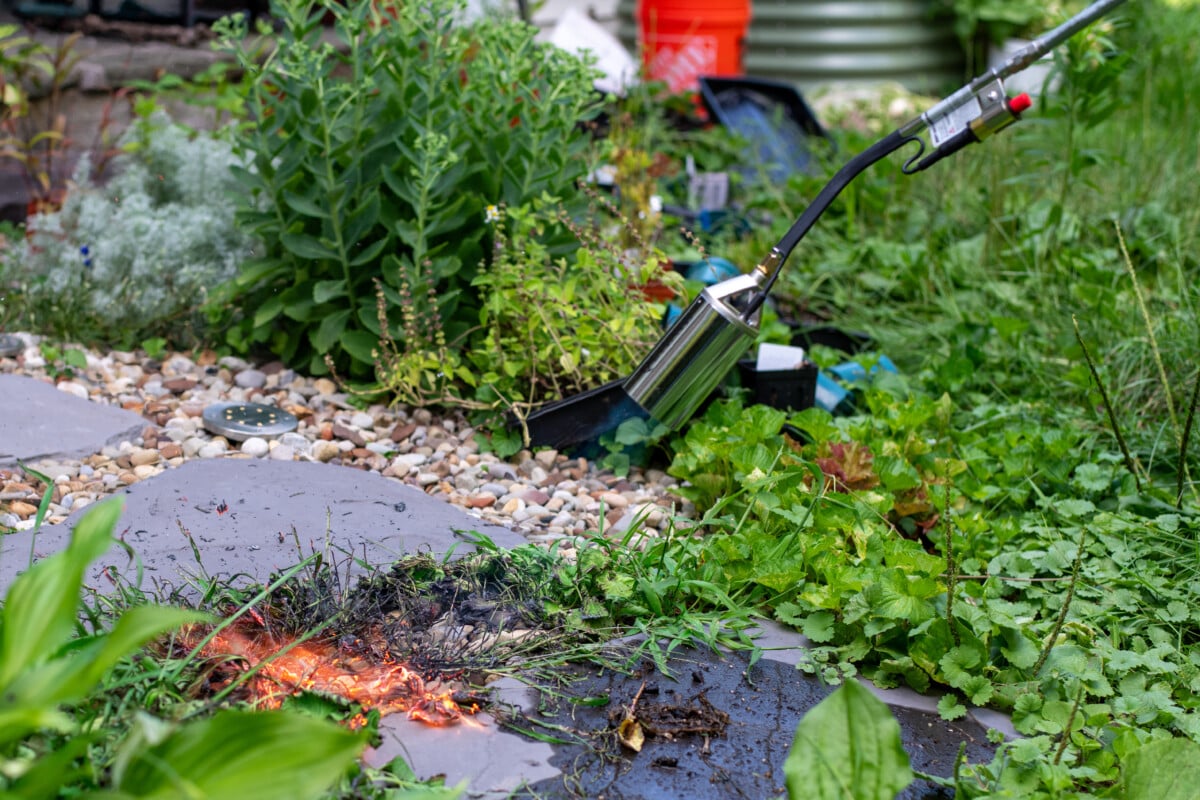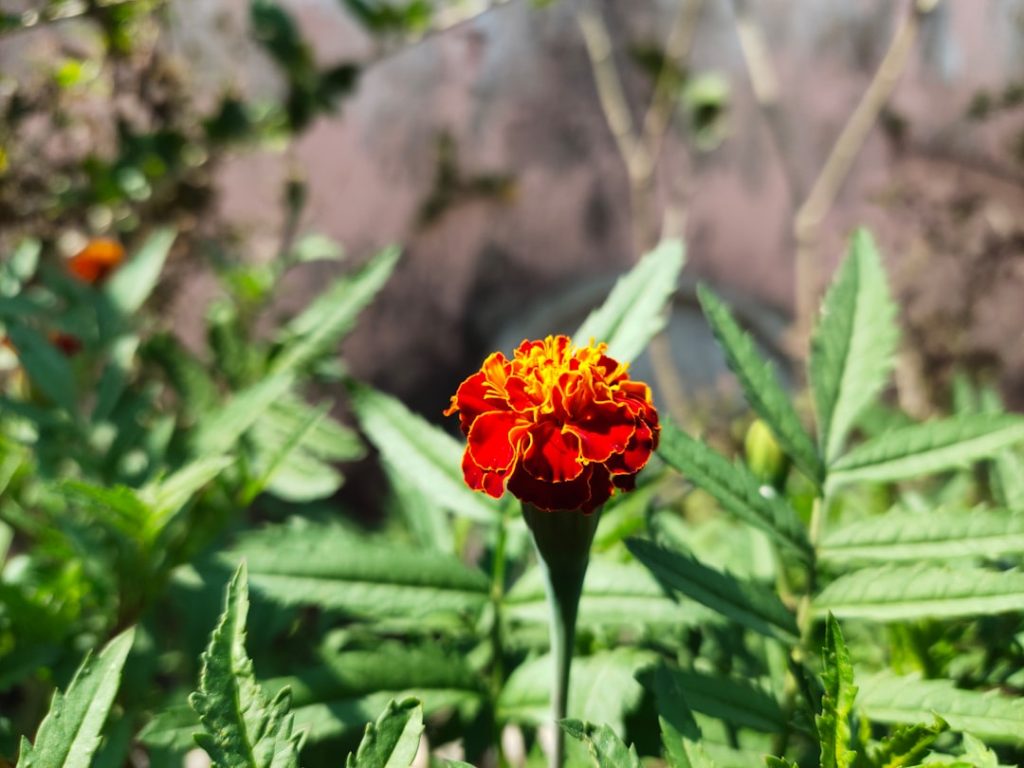Are weeds taking over your garden, making it hard for your plants to thrive? You might be wondering, “Can I burn weeds in my garden to get rid of them quickly?”
It sounds like a simple solution, but before you grab a match, there are important things you need to know. Burning weeds can seem effective, but it also comes with risks and rules that could affect your garden—and your safety.
Keep reading to discover whether burning is the right choice for your garden and what safer alternatives you can try instead. Your garden’s health depends on the right approach, so let’s dive in!
Risks Of Burning Weeds
Burning weeds may seem like a quick way to clear your garden. It can destroy unwanted plants fast. But it also comes with many risks you should know.
Fire can spread beyond your garden and cause damage. Burning can also harm your soil and nearby plants. Laws often control if you can burn weeds safely.
Fire Hazards In Residential Areas
Burning weeds in residential areas can cause fires to spread quickly. Dry grass and plants catch fire easily and may reach your house or neighbors’ homes. Wind can blow sparks far from your garden.
Uncontrolled fires cause property damage and risk lives. Fire departments may need to respond, which wastes resources and can be dangerous.
- Fire can jump to buildings and trees
- Wind spreads burning embers
- Risk of injury to people and pets
- Emergency services may be required
Impact On Soil And Plants
Burning weeds can damage your garden soil. Fire kills helpful insects and microbes that keep soil healthy. It also removes organic matter that plants need to grow.
Heat can hurt nearby plants and tree roots. Some weeds may grow back stronger after burning, making the problem worse.
- Soil loses nutrients and moisture
- Beneficial insects and microbes die
- Nearby plants can get burned
- Weeds may regrow quickly
Legal Restrictions
Many places have laws about burning weeds and yard waste. These laws protect people and the environment. You may need a permit or have to follow specific rules.
Penalties for illegal burning can include fines or other legal actions. Check with your local authorities before you burn anything in your garden.
- Permits may be required
- Burning may be banned in dry seasons
- Rules vary by city and state
- Fines apply for breaking the law

Credit: www.reddit.com
Alternatives To Burning Weeds
Burning weeds can harm your garden and the environment. There are safer ways to remove weeds that protect your plants and soil.
Try these alternatives to keep your garden healthy without using fire.
Manual Removal Techniques
Pulling weeds by hand is effective and simple. Use gloves to protect your hands and try to remove the roots to stop regrowth.
- Use a hand trowel to dig out deep roots
- Remove weeds after rain when the soil is soft
- Cut weeds close to the ground before they seed
- Regularly check your garden for new weeds
Natural Herbicides
Natural herbicides use ingredients from plants or other natural sources. They can kill weeds without chemicals.
| Natural Herbicide | How It Works |
| Vinegar | Acid dries out weed leaves |
| Salt | Dehydrates and kills roots |
| Boiling Water | Burns weed leaves and roots |
| Essential Oils | Disrupts weed growth |
Mulching Benefits
Mulch blocks sunlight and stops weeds from growing. It also keeps soil moist and adds nutrients.
Common mulch materials include:
- Wood chips
- Straw or hay
- Grass clippings
- Compost
When Burning Is Allowed
Burning weeds in your garden can help clear unwanted plants quickly. It is important to know the right conditions and rules before you start burning. This will keep you and your garden safe.
Many areas have laws about burning. Weather and timing also affect when you can burn safely. Read on to learn the key factors to consider.
Local Regulations To Check
Each city or county has rules about burning garden waste. You must follow these laws to avoid fines and fires. Check with your local fire department or government website before burning.
- Find out if you need a permit to burn
- Learn what materials are allowed to be burned
- Know the hours when burning is permitted
- Understand any fire bans or restrictions in place
- Follow safety rules such as keeping water nearby
Suitable Weather Conditions
Weather plays a big role in safe burning. Choose days with calm and clear conditions. Avoid windy or very dry days to stop fires from spreading.
| Weather Factor | Safe Condition | Unsafe Condition |
| Wind Speed | Less than 10 mph | More than 10 mph |
| Humidity | Above 40% | Below 40% |
| Temperature | Cool to moderate | Very hot |
| Rain | Dry but not drought | Dry and drought conditions |
Choosing The Right Time
Pick the best time of day to burn weeds. Early morning or late afternoon is best. The air is cooler and less windy then.
- Burn only during daylight hours
- Avoid burning near dusk or dawn
- Check local rules for allowed burning times
- Make sure you have help or supervision nearby
Safe Burning Practices
Burning weeds in your garden can help clear unwanted plants. You must follow safety rules to avoid accidents and fire spread.
Knowing how to burn safely protects your garden, home, and neighbors. Use these tips before starting any fire.
Preparing The Area
Clear the space around where you plan to burn. Remove dry leaves, grass, and flammable materials. Keep the fire away from trees and buildings.
- Choose a flat, open spot with no wind.
- Clear a 3-foot area around the burn site.
- Keep water or a hose nearby.
- Check local rules and weather before burning.
Essential Safety Equipment
Have the right tools to control the fire. Safety gear helps stop accidents and protect you.
| Equipment | Purpose |
| Water source (bucket or hose) | Put out flames quickly |
| Fire extinguisher | Control unexpected flare-ups |
| Gloves | Protect hands from heat and burns |
| Long sleeves and pants | Shield skin from sparks |
| Shovel or rake | Spread or cover embers |
Monitoring The Fire
Watch the fire constantly until it is fully out. Do not leave it unattended. Be ready to act if flames spread.
- Stay near the fire at all times.
- Keep water and tools within reach.
- Extinguish the fire completely before leaving.
- Check for hot spots or smoldering embers.
Post-burning Care
Burning weeds in your garden can clear unwanted plants quickly. After burning, your garden needs care to heal and stay healthy.
Proper care helps your soil recover and stops weeds from coming back. It also ensures safe disposal of ashes to protect the environment.
Soil Recovery Tips
After burning, your soil may lose nutrients and beneficial microbes. Help it recover by adding organic matter and watering gently.
- Add compost or well-rotted manure to improve soil health.
- Water the area lightly to avoid washing away nutrients.
- Plant cover crops like clover to protect soil from erosion.
- Avoid heavy foot traffic to let soil settle and heal.
Preventing Weed Regrowth
Burning kills weeds but does not stop new ones from growing. Use these methods to keep your garden weed-free longer.
- Apply mulch to block sunlight and stop weed seeds from sprouting.
- Remove weed roots and seeds by hand regularly.
- Plant dense ground covers to outcompete weeds.
- Keep the garden soil healthy to support strong plants.
Disposal Of Ashes
Ashes from burning weeds contain nutrients but can also harm plants if used carelessly. Handle ashes safely to protect your garden.
| Action | Reason |
| Cool ashes completely before moving | Prevent fire hazards and burns |
| Sprinkle ashes thinly over compost | Add potassium and minerals safely |
| Avoid heavy ash layers on plants | Prevent soil pH from becoming too alkaline |
| Dispose of excess ashes in green waste bins | Protect soil and water quality |

Credit: www.ruralsprout.com

Credit: www.epicgardening.com
Frequently Asked Questions
Can I Legally Burn Weeds In My Garden?
Laws vary by location, so check local regulations before burning weeds. Some areas restrict open fires to prevent wildfires. Always follow safety guidelines and obtain permits if needed to avoid fines or hazards.
What Are The Risks Of Burning Weeds In Gardens?
Burning weeds can cause fire hazards, damage soil health, and release harmful smoke. It may also harm beneficial insects and nearby plants. Consider safer weed control methods to protect your garden and environment.
Are There Safer Alternatives To Burning Garden Weeds?
Yes, mulching, hand-pulling, and using organic herbicides are safer. These methods protect soil quality and beneficial organisms. They also reduce fire risks and comply with local regulations, making them more environmentally friendly.
How Does Burning Weeds Affect Soil Quality?
Burning weeds can destroy beneficial soil microbes and reduce organic matter. This harms soil fertility and structure, making it less healthy for plants. Avoid burning to maintain a rich, balanced garden soil ecosystem.
Conclusion
Burning weeds can be helpful but carries risks. Always check local rules before starting a fire. Use fire safely to protect your garden and home. Consider other weed control methods for better results. Remember, a healthy garden needs care and patience.
Choose the best way that fits your needs. Stay safe and enjoy your green space.


